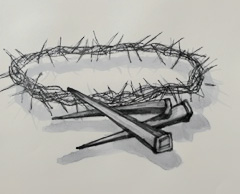“For we have not a High Priest who is unable to sympathize with our weaknesses, but one who in every respect has been tempted as we are, yet without sin.”
Hebrews 4:15 (RSV)
It’s easy to say “I’m only human,”when I fail to follow the ways that Jesus taught me, but sometimes I forget that Jesus was also human. He was both fully human and fully divine.
His divinity is apparent in the gospels and He was adored for His ministry of miracles, followed by His saving death and resurrection, yet Jesus also had a very human side, which He lived out as a boy and a man for thirty long years, before ever revealing His divinity to the world.
The gospels are primarily stories of Jesus’ ministry, sharing only brief moments about His infancy or boyhood. His ministry began at thirty years old, so what about the thirty years before that?
We can only gather tidbits about His thirty years prior, living a normal, yet pious life, growing up in Nazareth, laughing and playing with other children. His neighbors simply knew Him as Yeshua, the son of the carpenter and Mary. He grew up in His family’s customs and faith, observing all the Mosaic teachings, the feasts and holidays of His Jewish culture. The customs of His time reveal that He would have learned His father’s carpenter trade, working alongside him, during all those years.
We know, at thirty, Jesus left home to launch His ministry, which began with water baptism, followed by time spent in the desert, where He encountered His strongest human temptations. Today’s scripture tells us that He was fully acquainted with all the tests and temptations of life, except He was without sin.
While Jesus was sinless, He still knew what it felt like to experience the emotional storms of temptation and testing, just as we do.
Later in His ministry, He experienced the emotional pain of betrayal, disrespect and rejection from those He loved. Besides Judas, who was His close friend for three years, He faced being rejected by some who might have been His childhood friends, religious leaders or relatives, who He knew and loved all His life.
Jesus performed many miracles, signs, and wonders during His final three years of ministry, but we seldom reflect on His humanity for the thirty years beforehand.
When we think about it, Jesus was fully divine, yet lived 90% of His life span in a human way at home in Nazareth. We may not know very much about his early life during those first thirty years, but we can be sure He is able to identify with anything we currently struggle with.
In His human body, Jesus was tested in all ways as we are. He knew physical and emotional pain, along with spiritual and mental anguish, and He also felt hurt, frustration and anger. He was provoked, but never retaliated, He never lost His faith, and He never sinned against God, His Father.
He endured everything and followed the will of His Father, loving Him with all His heart, soul, mind and strength. He didn’t just follow the law, He was the fulfillment of every law, all the way to the end.
Jesus is not only a sympathizer of our suffering, He is a veteran of all testing, trials and temptations. He knows all about it because He has experienced it.
His life’s purpose was not to punish or retaliate, but to save. He said,
“I did not come to judge the world but to save the world.” (John 12:47)
He spoke God’s truth about sin, humility, forgiveness and eternal life. Then He moved on to whoever would listen next.
He asks us to stay connected in Him, like a branch connected to a vine, for life and nourishment. In our humanity we follow His humanity, imitating His obedience. His grace paid the price for our atonement and He wants to intercede for us daily, as our High Priest. As we come to Him, we identify with His humanity, but we worship His divinity.
There’s no better High Priest than Jesus, who demonstrated His love for us by becoming our Lamb of God, “He made Him who knew no sin to be sin in our behalf, so that we might become the righteousness of God in Him.” (2 Corinthians 5:21)
The invisible God and Father, loved us so much that He clothed His divine Son in a human body like our own, and then put His Spirit in our human bodies to dwell in us and help us throughout our lives. It’s the greatest exchange and expression of God’s love since creation.
Jesus, thank you for being both our High Priest and our Lamb of God. You shared your humanity with us, then bought our salvation with your precious blood, and now we adore you in your glorious divinity, forever and ever. Amen
